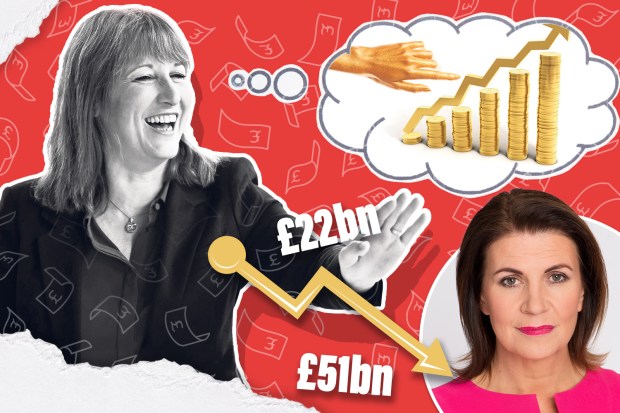Politics
Reeves Faces Economic Challenges as Black Hole Grows to £51 Billion

Chancellor Rachel Reeves is grappling with significant economic challenges as new data reveals that the UK’s fiscal black hole has expanded dramatically. According to the National Institute of Economic and Social Research, the gap identified last July at £22 billion has more than doubled to a staggering £51 billion. This increase raises serious questions about the government’s economic strategy and its ability to fulfill promises made to the public.
During her first year in office, Reeves focused heavily on achieving economic growth, a central theme during the 2024 election campaign. The Labour government positioned growth as the solution to fund various initiatives. However, the reality is stark; instead of fostering growth, Reeves has presided over a significant deterioration in the nation’s fiscal health.
As Reeves prepares for her second Budget in October, the urgent need to address the burgeoning black hole dominates discussions. The Chancellor has three primary options: increase borrowing, cut public spending, or raise taxes. Each option carries substantial political ramifications, and the implications for the average taxpayer are significant.
Increasing borrowing may seem like an easy fix, but such a move would violate the government’s existing fiscal rules. This could lead to increased scrutiny from financial markets, higher debt servicing costs, and potentially jeopardize Reeves’s position. Currently, the UK is spending over £110 billion annually just to service existing debt, a figure that exceeds the annual defense budget.
Cutting spending is another avenue, but many believe it will not suffice to balance the books. Small adjustments, such as reducing bureaucratic red tape or improving efficiency, are unlikely to achieve the necessary savings. The welfare budget, which amounts to £327 billion—a quarter of all government expenditures—could be a key target. Significant reductions in areas like disability benefits and housing support may be necessary, but these measures are politically sensitive and could provoke backlash from Labour backbenchers.
Reeves’s government has made a manifesto commitment to avoid raising the rates of the three primary taxes on working people: income tax, National Insurance, and VAT. Yet, there is growing concern that this promise may not hold as the financial situation worsens. Sir Keir Starmer, the party leader, did not reaffirm this commitment, suggesting that tax increases may be on the table.
The prospect of a “wealth tax” has been floated by some Labour MPs as a potential solution. However, critics argue that the number of ultra-wealthy individuals in the UK is insufficient to cover the escalating fiscal deficit. Moreover, increased taxation could drive these individuals to relocate abroad, further complicating the situation.
While the government had pinned its hopes on economic growth to resolve its fiscal challenges, the reality is that the black hole has only deepened. Unless an unforeseen economic miracle occurs, taxpayers may soon face higher taxes across various fronts, including increased business taxes, council tax hikes, and additional environmental levies.
As the government navigates these turbulent waters, the path ahead remains uncertain. The nation waits to see how Rachel Reeves will address the growing economic crisis and what it will mean for ordinary citizens in the UK.
-

 Entertainment2 months ago
Entertainment2 months agoIconic 90s TV Show House Hits Market for £1.1 Million
-

 Lifestyle4 months ago
Lifestyle4 months agoMilk Bank Urges Mothers to Donate for Premature Babies’ Health
-

 Sports3 months ago
Sports3 months agoAlessia Russo Signs Long-Term Deal with Arsenal Ahead of WSL Season
-

 Lifestyle4 months ago
Lifestyle4 months agoShoppers Flock to Discounted Neck Pillow on Amazon for Travel Comfort
-

 Politics4 months ago
Politics4 months agoMuseums Body Critiques EHRC Proposals on Gender Facilities
-

 Business4 months ago
Business4 months agoTrump Visits Europe: Business, Politics, or Leisure?
-

 Lifestyle4 months ago
Lifestyle4 months agoJapanese Teen Sorato Shimizu Breaks U18 100m Record in 10 Seconds
-

 Politics4 months ago
Politics4 months agoCouple Shares Inspiring Love Story Defying Height Stereotypes
-

 World4 months ago
World4 months agoAnglian Water Raises Concerns Over Proposed AI Data Centre
-

 Sports4 months ago
Sports4 months agoBournemouth Dominates Everton with 3-0 Victory in Premier League Summer Series
-

 World4 months ago
World4 months agoWreckage of Missing Russian Passenger Plane Discovered in Flames
-

 Lifestyle4 months ago
Lifestyle4 months agoShoppers Rave About Roman’s £42 Midi Dress, Calling It ‘Elegant’









